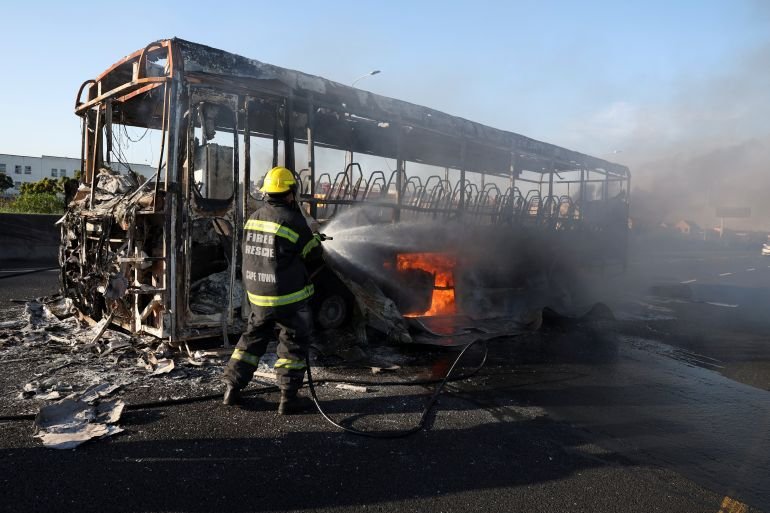Taxi Unrest in South Africa: British National Amongst 5 Killed in Escalating Violence
Firefighters extinguish a burning bus that was set alight during a protest by taxi drivers in Cape Town, South Africa, on August 3, 2023 [Esa Alexander/Reuters]
The taxi industry in South Africa plays a pivotal role in the nation's transportation system. For many, taxis are not just a mode of transport but a lifeline, connecting them to work, school, and essential services.
However, recent tensions between the taxi industry and the government have escalated into full-blown strikes, leading to widespread disruptions. At the time of writing, 5 people have been killed as violence escalated during the strikes, including one British National.
At the heart of the dispute are new regulations introduced by the Cape Town municipality, which have resulted in the seizure of taxis for various offenses. The impounding of 15 minibuses was the initial spark, but the situation quickly escalated with a staggering 6,000 vehicles impounded within six months.
The South African National Taxi Council (Santaco), feeling aggrieved by these actions, initiated the strikes.
The taxi drivers and owners initiated the week-long strike as a response to what they perceived as "heavy-handed tactics" by law enforcement authorities. Such offenses included not wearing seatbelts and driving in the emergency lane.
The drivers argued that while they faced vehicle impoundment for these infractions, others committing the same offenses merely received fines.
In a particularly tense episode, residents of the Masiphumelele township erected barricades, effectively trapping other residents within the area. These barricades later became the focal points of further violence when they were set alight.
Santaco, in its communications, has expressed a desire for a resolution, indicating that they are open to discussions with the government. Similarly, the government has shown a willingness to engage, seeking a way to address the concerns of the taxi industry while ensuring the safety and well-being of the public.
Beyond the immediate human toll, the strikes have had a cascading effect on daily life in South Africa. Commuters, left stranded, have had to find alternative means of transport, often at great personal expense.
The education sector has been particularly hard hit, with nearly 300,000 learners unable to attend school. The economic ramifications, too, are significant, with local businesses suffering losses due to disruptions.
The unrest has not gone unnoticed on the global stage. Countries such as the US, UK, and Australia have issued travel advisories, cautioning their citizens about the ongoing situation in South Africa. These advisories, while necessary for the safety of international travelers, could have long-term implications for South Africa's tourism industry, a vital sector of the economy.
In the face of adversity, the South African community has showcased resilience and solidarity. Local residents have come together to assist those affected by the strikes, providing shelter, food, and support. Schools have opened their doors to stranded students, ensuring their safety during these tumultuous times. This spirit of community, of coming together in the face of challenges, is emblematic of the South African ethos.


